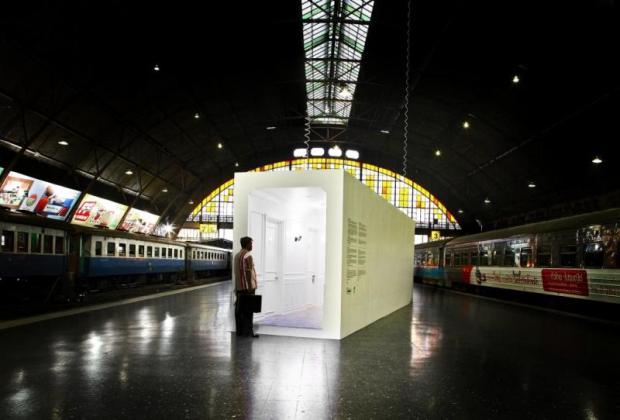Scandinavian artistic duo Michael Elmgreen and Ingar Dragset -- two of the world's most admired artists, whose giant, vertical swimming-pool structure is now on show as part of the Bangkok Art Biennale 2018 -- have a penchant for the fun, absurd and provocative.

Elmgreen & Dragset's Dislocated Oriental (2008), in Hua Lamphong Station. Photo courtesy of Pimplus
For more than 20 years, Elmgreen & Dragset, as they're known, have exhibited their cheeky and ambitious artworks around the world, critiquing society's norms as well as challenging and transforming the ways the public interacts with art and the public sphere.
They've transformed white-cube galleries into an abandoned subway station, a nightclub, and most recently an abandoned swimming pool. They've built a Prada boutique -- Prada Marfa -- in the middle of a Texas desert to see if it'll survive (vandalised, but yes, it does), and they've carved a hole into a gallery ceiling so audiences can poke their heads into the kitchen of an unsuspecting Italian nonna to try to remedy the divide between the elitist contemporary art world and regular folks.
Back in 2002, they came to Thailand for a group exhibition called "Beyond Paradise: Nordic Artists Travel East", wherein they had two men apply white paint on the white walls of the gallery for a period of six weeks. This, in a way, poked fun at the art world itself, examining the white-on-white power structures of Western art discourse as well critiquing the sterile, gentrified and elitist nature of white-cube galleries around the world.
In 2008, they placed a 10m-long replica of the Mandarin Oriental Hotel corridor -- Disoriented Oriental -- in the middle of Hua Lamphong Station, commenting on the stark class divide among Thailand's working class and elite.

Elmgreen & Dragset's Zero, currently displayed along the Chao Phraya. Photos courtesy of Bangkok Art Biennale 2018
Now the duo (who dated but now work exclusively as artistic partners) are back in the Kingdom for the inaugural Bangkok Art Biennale, placing one of their most famous motifs -- a swimming pool -- on the Oriental Pier overlooking the Chao Phraya River.
Titled Zero, Elmgreen & Dragset's pool is an 8m upright empty frame with steps and diving board attached. The "water" inside the pool is the flowing river behind. Through the minimalist piece, the duo seems to take a jab at the fast-paced gentrification of cities, where public land becomes privatised for only a select few to use.
"There are a lot of fancy hotel pools in Bangkok but they're not really a tradition in Thai culture," says Elmgreen, the more talkative of the two with a slight Scandinavian intonation. "[It's] some kind of Western cultural influence coming in with the tourism to the city, making these swimming pools be in all the hotels. So when we do our public pool in the public world, it's a big empty pool. There's no possibility of taking a big dive into it."
"And recently at the Whitechapel Gallery in London, a show that's still on," he continued, "we changed the space into an abandoned public swimming pool, because a lot of public spaces have been closed down in London in the past 10 years. Not only public swimming pools, but 400 public libraries. So we speak about how public space is lessening in many of the big cities as it's getting privatised everywhere."
Deconstructing norms and looking at objects and places in a new light is fundamental to the duo's artistic process.

Elmgreen & Dragset's Gay Marriage, comprised of porcelain urinals, taps and stainless-steel tubing. Photo: Matthias Kolb
"For us, it's natural to question conventions of things that are claimed to be for everyone," Elmgreen said. "It comes quite naturally because we're gay men. So when you're in high school and you read Romeo And Juliet and you're told that this is a universal story about love, you're like, 'Yeah, but I need to think about it in a different way [laughs]'. So because of religion, because of sexuality, because if you come from a different background as an immigrant in a country, you always question the normative culture in a different way. Everything that society takes for granted, you have to say, 'Hm. But where do I fit in?', or 'How can I kind of use the culture in my way from my perspective?'.
"For us, it's important to speak about this idea about all kinds of aesthetics, all kinds of formal languages, all kinds of big classics in literature will be read in different ways depending on what background you come from."
Zero could fall into their idea behind their series of "Powerless Structures" too. Inspired by French philosopher Michael Foucault, Elmgreen & Dragset change the structures of different spaces, everyday designs and ways of looking at art in order to subvert the meanings and symbols that society applies to those certain items. By changing the function or aesthetic of certain objects or places, the duo forces viewers to reflect on ideas or problems that they have never previously thought about.
"Like you don't think so much if you go into a Prada store and you shop and have enough money for that," said Elmgreen. "If you have a Prada store in the middle of the desert and you can't shop, you suddenly think about how strange that shop actually looks."
But what stands out most to the public is their dry and dark humour, which has been constant throughout their more than 20 years together.
"I'm glad you said dark humour," laughed Dragset. "It's connected to a certain frustration or sadness maybe, as well as about something in society. But humour can be a way of survival when life around feels quite tough or challenging somehow. As [Elmgreen] says, it's a form of anger management as well."

Elmgreen & Dragset.
